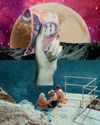
One of the first pieces of advice Dr Mike Rucker gives in his book about fun is to throw away your iron. Ironing, he contends, is
“agonising”. It’s a needless, thankless task that monopolises time that could be better spent enjoying exuberant, uplifting fun. Play is good for your body, mind and soul. Ironing offers none of that.
“Unless you’re in a handful of fields that demand starch, you could probably throw out your iron and nobody would notice,” the organisational psychologist writes in The Fun Habit.
As far as self-help messages go, it’s an easy one to obey. But that makes it no less important. For Dr Rucker, fun is serious business. He believes we are in an epidemic of drudgery that is not only sapping our vitality but destroying our mental and physical health.
“We live in a world which is critically fun starved,” he tells me over the phone from his Californian home. “We’re conditioned, as we age, to believe that trying to have fun is childish, even inappropriate. We undervalue the mental and physical benefits of fun.
“There’s emerging research that’s making the case that leisure and fun are as vital as sleep,” he continues. “There’s the need for rest and then there’s the need for restoration.”
We know, intuitively, that enjoying ourselves reduces stress but it goes far deeper than that. When we do something spontaneous, surprising or unexpected, we create special moments. “When we’re indexing those memories, it creates neuro-plasticity,” Dr Rucker says. Fun is good for our brains.
This story is from the November 2023 edition of Australian Women’s Weekly NZ.
Start your 7-day Magzter GOLD free trial to access thousands of curated premium stories, and 9,000+ magazines and newspapers.
Already a subscriber ? Sign In
This story is from the November 2023 edition of Australian Women’s Weekly NZ.
Start your 7-day Magzter GOLD free trial to access thousands of curated premium stories, and 9,000+ magazines and newspapers.
Already a subscriber? Sign In

How to boost the value of your home
Whether you're looking to sell now or later down the track, it really pays to keep your house up to date.

The magic of manifesting
While it sounds woo-woo, putting your mind to what you want might be the key to turning your dreams into reality.

A quiet killer
Difficult to detect, ovarian cancer is silently taking the lives of women. Here's what you need to know.

Air fryer snacks
The air fryer makes cooking so simple. From healthier versions of fried favourites to baked treats, these easy recipes are made to enjoy!

The billiondollar world of astrology
Astrology is back. Celebrities won't make a move without consulting their charts and everyone knows someone who's retraining as an astrologer. The Weekly investigates the current fascination with the stars.

The shape shifters
Contouring with make-up is a clever hack for instant facial definition.

"I'm a professional baby cuddler!"
When Jenny Summerson’s own children grew up, she looked for something to fill the hole in her life. What she found were babies who needed a little extra TLC.

Princess Catherine THE REALITY OF A NEW NORMAL
After the hardest year of her life and as she finds her footing in a post-treatment world, the dutiful princess could be preparing for her ultimate role- but this time it's on her terms.

Put it in neutral
Far from middle of the road, neutral tones can really add interest and sophistication to your home. Here's how to nail it.

QUEEN OF COMEDY The Marvellous Ms Margolyes
Speaking her truth in a delightfully wicked and candid manner we've come to cherish, British actress Miriam is now telling the world how she has fallen in love with New Zealand.